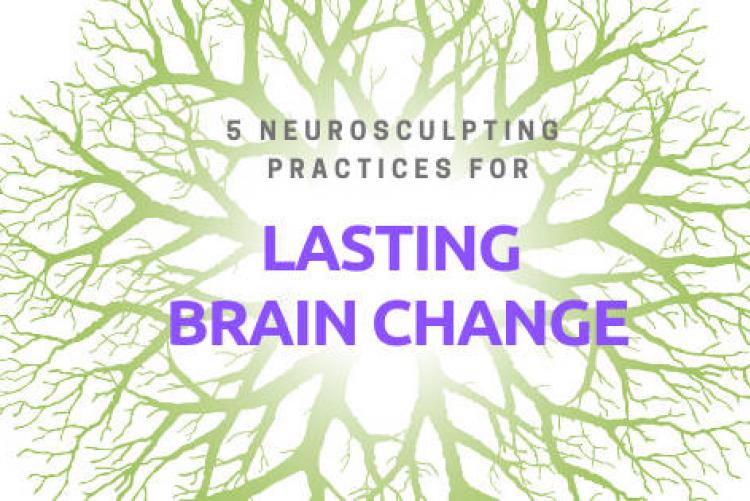1. Gratitude
2. Brain Nutrition
3. Daily Shaking Practice
4. Tapping with Non-Dominant Hand
5. Daily Novelty Exercises
How many times do you beat yourself up for repeating the same limiting or self-sabotage patterns even though you “know better”? You might find yourself reaching for the next self-help book or seminar which often reiterates all the ways you “know better.” Back to square one!
Part of the problem is that knowing better often has little power to actually create real and lasting brain change. Science supports the idea that our unconscious and subconscious processes account for far more of our behavior drivers than conscious thought processes. So if our behaviors and patterns are dictated more from subconscious patterns than conscious ones, it really does little good to “know better.” Instead, for lasting brain change we have to “do better.”
Self-directed neuroplasticity, and practices like Neurosculpting, are some of the keys to influencing our thought patterns, breaking old ones, and establishing new ones. The great news is we can use some simple practices to begin winning over the brain and body, priming it to be more predisposed to self-directed change. Incorporating these five best practices can open the doors to a more graceful, resilient, and lasting experience of change.
1. Gratitude
Having a gratitude practice has been neurologically and biologically proven to have a profound effect on the body and mind. When the mind and body reach these states we feel less apprehensive about change and more open to new possibilities and uncertainty. UC Berkeley reports that practicing gratitude can lead to:
- A strong immune system
- Lower blood pressure
- Joy
- Forgiveness
- Ease of chronic pain
- Compassion
- Social involvement
A simple gratitude practice can be five minutes in the shower making a list of the things in your day that support your comfort and safety. These might be appreciating the warm water, noticing you have shelter, or remembering you had a soft bed to sleep in. When you focus on the simple yet plausible things that support your comfort and safety, gratitude begins to cultivate naturally.
2. Brain Nutrition
Nourishing ourselves with foods high in Omega-3s and healthy fats is one of the best ways to support a healthy brain and a quality meditation practice in which to shift your patterns. Our body uses Omega-3s and healthy fats to build grey matter in our brain. In addition to brain nutrition, hydration is essential to healthy cognitive function, concentration, attention, memory and self-directed neuroplasticity.
A simple practice to begin priming you for brain resilience and change is to put your food on a plate, eat it at a table, and make sure you have a healthy fat, protein, and source of quality slow carbohydrates like vegetables.
3. Daily Shaking Practice
When we experience a stress response, stress hormones (including adrenaline) move into the bloodstream and muscles contract and tighten. These physical changes occur in order for the body to engage in a fight-or-flight response for protection. When the body is in this state we are at our most resistant to change.
In most of the stressors that we typically face in our daily lives, however, we do not hit or run our way out of the situation, and the contracted physical state remains for extended amounts of time unnecessarily. This ultimately creates a potential for long-term physical maladies, including chronic pain and illness, and a mental rigidity that sabotages change.
One of the best ways to release tension, stress, or contraction—and prime the brain for lasting change—is to quite literally shake it off!
Consider what a rabbit, or any mammal, does after it has been chased by a predator and is now safe: it likely hides under a bush or object and shakes until the adrenaline has dispelled and the muscles can relax. You may have experienced your body attempting to use this technique naturally and perhaps have even tried to resist or control involuntary shaking.
We can utilize this natural biological strategy to release muscle tension and alleviate stress hormone buildup in the body. Consider finding a private space and informing people that you will be shaking so they know there is no medical emergency. Having a daily shaking practice releases unused and un-useful tension and contraction, allowing for alleviation and relaxation.
Feel free to shake violently and to even develop a daily shaking practice—as many others have!
4. Tapping with Non-Dominant Hand
This is one of our favorite Neurosculpting tricks! When you are in a meditation and find yourself in a moment that you would like to access easily later or anchor in now, you can tap a part of your body with your non-dominant hand. Creating a physical sensation in connection with a particular experience creates an association. This physical association makes the experience more easily accessible later.
Tapping can be used to retrieve the memory during another meditation, and even throughout the day. While it may not be as in-depth as a full meditation, tapping in the same place on your body with your non-dominant hand will bring the experience to mind. Imagine trying to establish a new pattern yet never having real-time moments to remind your subconscious mind of it. That new pattern will simply begin to fade away.
With this simple tip you can give gentle reinforcement to your new pattern while standing in line at the grocery store, driving in your commute, cooking, or showering. You can tap with your non-dominant hand in most moments and access the experience on a conscious or subconscious level.
5. Daily Novelty Exercises
Pique your brain’s interest with novel activities every time it crosses your mind. You can use imaginative yet non-threatening, simple exercises throughout the day to engage your brain. Ideas that are interesting, but not unnerving, can excite brain activity without a stressor and bring it into a heightened state of focus and receptivity to adaptation. This supports your brain’s capacity for pattern changes, problem-solving, goal-setting, and approaching your day with relaxed yet focused attention. Be creative and keep it simple.
Here is a list of novel and silly ideas to engage healthy activity in your brain throughout the day:
- Brush your teeth or hair with your non-dominant hand
- Get dressed out of order (opposite shoe first, shirt before pants)
- Reverse or rearrange your morning routine
- Imagine or envision a completely new shape or color
- Imagine what the world would look like if you walked on your hands
These simple practices each day gently engage our ability to down-regulate our rigidity and up-regulate our predisposition to adaptation so that when we focus on making changes the brain is as receptive and focused as possible. Lasting brain change is not about what you know, it’s about what you do.

Lisa Wimberger is the founder of the Neurosculpting® Institute. She holds a master’s degree in education, a certificate in the Foundations of NeuroLeadership, and certificates in medical neuroscience, visual perception, the brain, and neurobiology. She is the author of New Beliefs, New Brain: Free Yourself from Stress and Fear, and Neurosculpting: A Whole-Brain Approach to Heal Trauma, Rewrite Limiting Beliefs, and Find Wholeness. As the founder of the Neurosculpting modality, Lisa runs a private meditation practice in Colorado, teaching clients who suffer from stress disorders. She is a faculty member of Kripalu Yoga and Meditation Center, the Law Enforcement Survival Institute, Omega Institute, and 1440 Multiversity.
- Log in to post comments





















